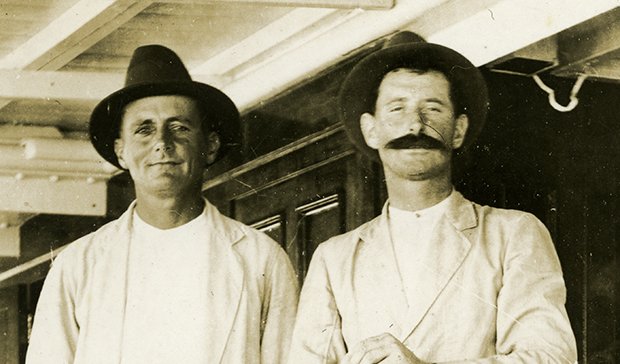Tennant Creek to Darwin: 1000km journey of Albert Borella VC

IN 1915, SHAKEN BY the brutal news from Europe, Albert Borella made a pledge that would take him from the remote outback of Australia, to the war fields of Gallipoli and France, where he would eventually receive a Victoria Cross medal.
His journey began by foot from Tennant Creek to Renner Springs, from where he rode by horseback to Katherine, before hitching a ride to Pine Creek on a horse-drawn mail coach, and finally catching the train to Darwin where he arrived six weeks later.
Upon arriving in Darwin, after the huge journey, Borella found out he was unable to enlist because the military wasn’t accepting volunteers in the Northern Territory.
Undeterred, he set-off by ship to Townsville, where he was accepted on 15 March 1915 and finally posted to the 26th Battalion of the First Australian Imperial Force. He was sent to both Gallipoli and then the Western Front in.
Albert Borella: formidable strength of character
Borella’s formidable strength of character was displayed on the battlefield and earned him the prestigious Victoria Cross in 1918 for valour in battle (in 1917), showing immense courage and leadership. He was one of only 64 Australian soldiers in WWI to receive this honour.
The official account read: “Whilst leading his platoon, Lieutenant Borella ran out ahead of his men into a machine gun barrage from the Germans, with only his revolver, the Germans outnumbering his platoon by ten to one. His cool determination inspired his men to resist heroically, and the enemy were repulsed, with heavy losses.”
Among his other military recognitions, Borella received the Military Medal and a Mention in Despatches, for his bravery on the battlefield.
During World War II, Albert Borella served again, in Australia, and was promoted to Captain in 1942. Albert Borella VC, died on 7 February 1968 and was buried with full military honours at the Albury Presbyterian cemetery in New South Wales.
Ride commemorates Borella’s journey to enlist
Nearly 100 years on, coinciding with the Anzac Centenary (2014 – 2018) and 100 years since Australian troops landed at Gallipoli, Richard Borella has embarked on the same path taken by his grandfather.
From 20 February to 3 March 2015, Borella’s grandson and his team of three companion riders symbolically retraced the 1915 trip. They recreated the historic journey using the same modes of transport and experiencing the same rough conditions as all those years ago.
The Borella Ride also honoured the contributions made by all Australians during WW1, in the Northern Territory’s flagship ANZAC Centenary event.
The riders covered 160km by foot, 504km by horseback, 90km by horse-drawn mail cart and 253km by train on the 12-day journey of remembrance.

